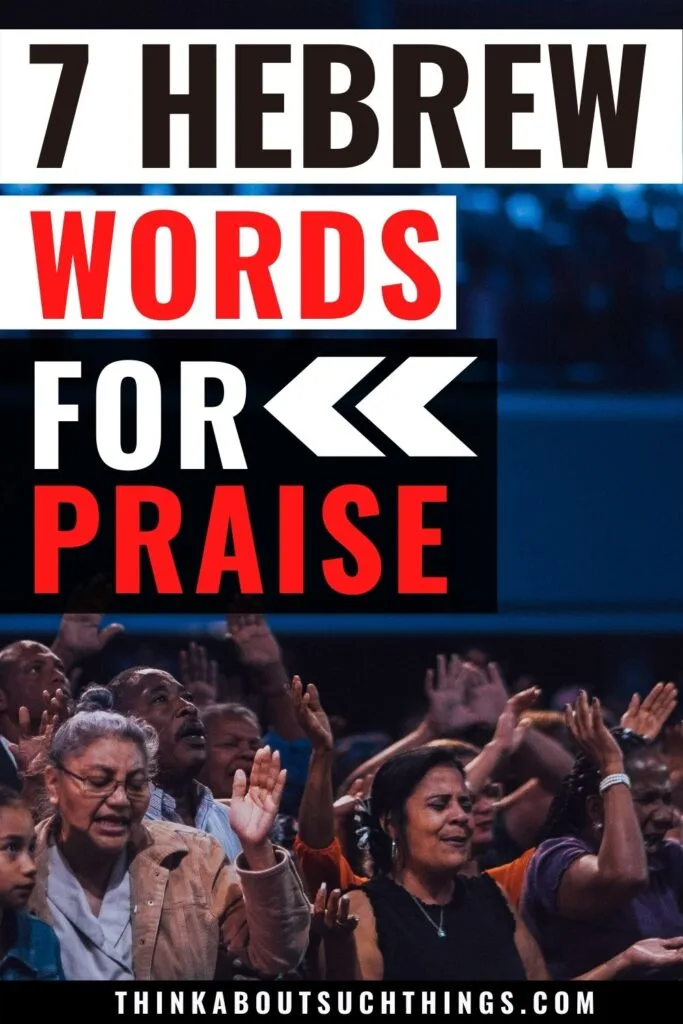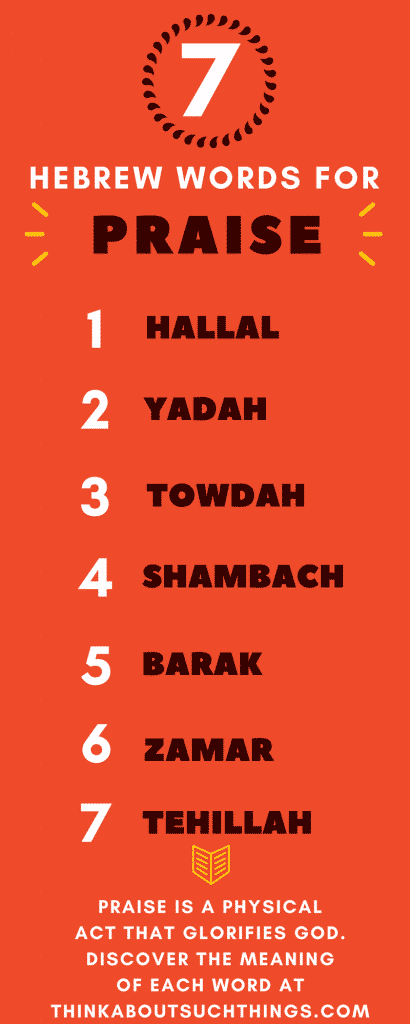In this study, we will take a look at the Hebrew words for praise. Looking through scripture we find 7 words that are used to mean the word, “praise.”
After writing What is the Difference between Worship and Praise I wanted to share in-depth the Hebrew words for praise.
In the English translations of the Bible, we take these beautiful Hebrew words and convert them into a few words and mainly the word… “Praise.” In certain verses, we do see it translated into thanksgiving or thanks.

So, much is lost in the translation and the only way to unlock it is to study it. And that’s exactly what we are going to do today.
We are going to unwrap these 7 Hebrew words of praise!
When we lift our hands in praise and worship, we break spiritual jars of perfume over Jesus. The fragrance of our praise fills the whole earth and touches the heart of God.
dennis ignatius
The 7 Hebrew Words for Praise

As we go through each word I will share the Strong’s Concordance definition and meaning of the Hebrew word. I will also share other scripture references.
1. Hallal הָלַל
Psalm 113:1-3– Praise (hallal) ye the Lord, praise (hallal) o ye servants of the Lord, praise (hallal) the name of the Lord
הָלַל hâlal, haw-lal’; a primitive root; to be clear (orig. of sound, but usually of color); to shine; hence, to make a show, to boast; and thus to be (clamorously) foolish; to rave; causatively, to celebrate; also to stultify:—(make) boast (self), celebrate, commend, (deal, make), fool(-ish, -ly), glory, give (light), be (make, feign self) mad (against), give in marriage, (sing, be worthy of) praise, rage, renowned, shine.
I love how one part of the meaning of halal means to “act madly, act like a madman.” Paints the picture of David beautifully when he danced before the Lord and his people undignified.
It’s interesting to note that our word, “hallelujah” stems from here. It is a combination of the word Halal (praise) and Yah (Yahweh). We would read it as, “praise the Lord“
It’s also considered one of the primary Hebrew words for praise. It is used 96 times throughout the old testament.
Other References for Hallal: Judges 16:24; 2 Samuel 14:25; Psalm 113:1-3; 2 Chronicles 7:6; Ezra 3:10-11; Psalms 18:3, 56:4, 63:5, 150:2-4; Nehemiah 5:13 Isaiah 62:9; Jeremiah 20:13; Joel 2:26
2. Yadah יָדָה
We see Yadah in action in most worship services. It simply means“the extended hand, to throw out the hand, therefore to worship with extended hand, to lift the hands.” Strong’s #H3034
יָדָה yâdâh, yaw-daw’; a primitive root; used only as denominative from H3027; literally, to use (i.e. hold out) the hand; physically, to throw (a stone, an arrow) at or away; especially to revere or worship (with extended hands); intensively, to bemoan (by wringing the hands):—cast (out), (make) confess(-ion), praise, shoot, (give) thank(-ful, -s, -sgiving).
Psalm 107:15 – Oh that men would praise (yadah) the Lord for His goodness, and for His wonderful works to the children of men.
Other references for yadah: Psalm 63:1; Genesis 29:35, 49:8; 2 Chronicles 20:21; 2 Chronicles 7:3,6; Psalms 67:3, 108:3; Isaiah 12:1,4; Jeremiah 33:11
3. Towdah תּוֹדָה
Towdah comes from a similar root word as yadah, but is used more specifically.
Towdah literally means, “an extension of the hand in adoration, avowal (an open statement of affirmation; frank acknowledgment or admission.), or acceptance.” Strong’s #H8426
תּוֹדָה tôwdâh, to-daw’; from H3034; properly, an extension of the hand, i.e. (by implication) avowal, or (usually) adoration; specifically, a choir of worshippers:—confession, (sacrifice of) praise, thanks(-giving, offering).
In the Psalms and elsewhere it is used for thanking God for “things not yet received” as well as things already at hand.
You can look at it as the Hebrew word associated with a sacrifice of praise.
I love this quote from, Tom Inglis…
“Enter into His gates with thanksgiving (Towdah), And into His courts with praise. Be thankful to Him, and bless His name (Psalm 100:4). Towdah is a praise-filled confession that God’s word is infallible and working in your circumstances.”
Tom Inglis
Another verse using the word, “praise” instead of thanksgiving:
Psalm 50:14 -Offer unto God praise (towdah) and pay thy vows unto the Most High.”
Other references for towdah: Psalms 42:4, 56:12; Jeremiah 17:26; Jeremiah 33:11
4. Shabach שָׁבַח
Shabach is a pretty simple one to understand and it makes me happy. It’s the moment when you just have to shout it loud how good God is! – Strong’s #H7623
שָׁבַח shâbach, shaw-bakh’; a primitive root; properly, to address in a loud tone, i.e. (specifically) loud; figuratively, to pacify (as if by words):—commend, glory, keep in, praise, still, triumph.
Psalm 145:4 – One generation shall praise (shabach) Thy works to another and declare Thy mighty acts.
Other references for shabach: Psalm 47:1; Psalms 63:3, 117:1, 145:4; Ecclesiastes 4:2; Isaiah 12:6
5. Barak בָּרַךְ
Barak is usually seen in a time of prayer, but it is a form of praise and adoration to God. It’s a humble position before God. – Strong’s H1288
בָּרַךְ bârak, baw-rak’; a primitive root; to kneel; by implication to bless God (as an act of adoration), and (vice-versa) man (as a benefit); also (by euphemism) to curse (God or the king, as treason):
Psalm 34:1 – I will bless (barak) the Lord at all times; His praise shall continually be in my mouth.
Other references for barak: Psalm 95:6; 1Chronicles 29:20; Judges 5:2; Psalms 72:15, 96:2, 103:1-2
6. Zamar זָמַר
Now with Zamar, you will start to see where our modern-day worship services involve musical instruments. Churches worldwide praise God this way, and it’s been going on since the Old testament!
Strong’s #H2167
זָמַר zâmar, zaw-mar’; a primitive root (perhaps identical with H2168 through the idea of striking with the fingers); properly, to touch the strings or parts of a musical instrument, i.e. play upon it; to make music, accompanied by the voice; hence to celebrate in song and music:—give praise, sing forth praises, psalms.
Psalm 21:13 – Be exalted O Lord, in Thine own strength, so will we sing and praise (zamar) Thy power.
Other references for Zamar: 1 Chronicles 16:9; Psalm 57:8-9; Judges 5:3; 2 Samuel 22:50; Psalms 61:8, 147:1
7. Tehillah תְּהִלָּה
Tehillah is derived from the word Halal. This and Zamar is where we get singing as a form of praise. But it can also be words spoken. – Strong’s #H8416
תְּהִלָּה tᵉhillâh, teh-hil-law’; from H1984; laudation; specifically (concretely) a hymn:—praise.
Isaiah 61:3 – To grant to those who mourn in Zion, Giving them a garland instead of ashes, The oil of gladness instead of mourning, The mantle of praise (tehillah) instead of the spirit of fainting, So they shall be called oaks of righteousness, The planting of the Lord, that He may be glorified.
Other references for tehillah: Exodus 15:11; Psalm 22:3; Deuteronomy 10:21; Nehemiah 9:5; Psalms 9:14, 22:25; Jeremiah 48:2

So, now you know what the difference is between praise and worship! Next time you are at church try praising God in some of these ways. It will truly bring Him glory.
Drop me a comment below and share your thoughts on this. I would love to hear how the Lord has been speaking to you about praise.
If you liked this post check out more articles on faith. Then please check out my Christian Articles

Melissa is a passionate minister, speaker and an ongoing learner of the Bible. She has been involved in church and vocational ministry for over 18 years. And is the founder of Think About Such Things. She has the heart to equip the saints by helping them get into the Word of God and fall more in love with Jesus. She also enjoys family, cooking, and reading.
She has spoken in churches in California, Oregon, Texas, and Mexico and has been featured in Guidepost Magazine and All Recipes Magazine. Read More…

BARBIE SUE SCOTT
Saturday 13th of August 2022
THANK YOU FOR EXPLAINING ALL THESE BEAUTIFUL HEBREW WORDS! GOD BLESS YOU! 🥰❤️😘❤️🙂❤️
linda
Saturday 5th of March 2022
I am really motivated with your website and i wish i could get some of what you do.
Patricia Tracy
Thursday 9th of September 2021
Wonderful reading! Rises up within my soul and spirit. Glory to God with praise, honor and power!